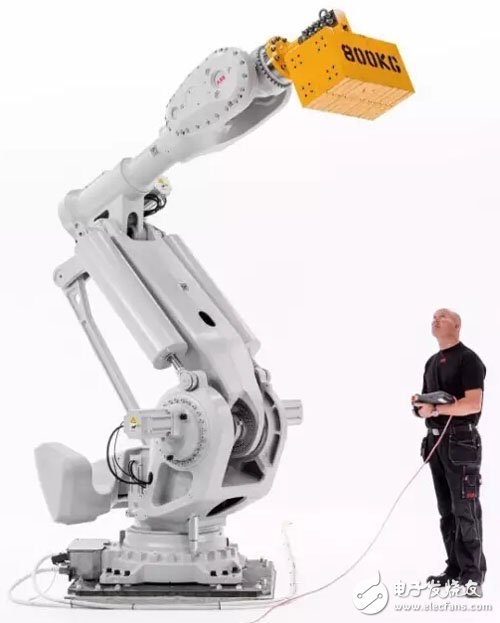Will the robot cause frontline workers to lose their jobs? How do Chinese industrial robot companies compete with the international market? China lacks innovative talents? On April 26th, in the master class of China Europe International Business School, ABB (China) Co., Ltd. Chairman and President Gu Chunyuan and Senior Vice President of Sanyi Group He Dongdong discussed with us the frontiers of intelligent manufacturing and "Internet of Things +" topic.
How does information technology integrate with manufacturing? What role does the robot play in the transformation of the intelligent factory? The three guests gave full discussion and analytical ideas.

Figure 1: Gu Chunyuan, Chairman and President of ABB (China) Co., Ltd. 
Figure 2: He Dongdong, Senior Vice President of Sany Group 
Figure 3: Zhu Tian, ​​Professor of Economics, China Europe International Business School
  
   Will the robot cause frontline workers to lose their jobs?
Zhu Tian: Will the frontline workers be unemployed in the process of transforming to a smart factory?
Gu Chunyuan: This topic was very intense in Germany in the 1970s and later proved to be a false proposition. When the media said that robots would come to steal our work, it was our enemy, but in the 1980s and 1990s, we began to say that robots are our friends. Looking at it now, Germany said that the application of robots is the main pillar of the German economy.
Specific to China, enterprises have reached a certain turning point, not necessarily able to recruit suitable personnel, labor costs continue to rise, companies began to consider replacing workers with machines. This is a gradual process, not a process from zero to one. Enterprises hope to provide better products, human-machine collaboration, and help enterprises upgrade faster. The most flexible and reliable people in the enterprise are people, as long as the cost is reasonable, people can use it.
Some positions held by machines are very laborious when they are manually operated. This is why we should liberate people from this position and let them enter the society to do something more creative. This is a positive thing from both an economic perspective and a social responsibility perspective.
How does information technology integrate with manufacturing?
Zhu Tian: Where is the integration of information technology and manufacturing technology? ABB and Sany Heavy Industry, respectively, as the leaders of multinational companies and local manufacturing companies, what strategies are there in the fourth wave of industrial revolution?
He Dongdong: From the practice of Sany Heavy Industry, we understand that the integration of information technology and manufacturing technology is digital, one is the Internet of Things.
Digitization, from the traditional integration of two, developed to transform all things, all processes, all products, all business information into data that can be stored and calculated. The Internet of Things, the physical world of the past and the Internet are separate. Now, using the Internet of Things to connect all the devices through the network, you can integrate various business models and intelligent analysis of big data with Internet data.
Our two tasks, one is to digitize as much as possible, the other is the Internet of Things, the integration of big data through the Internet of Things, and the transformation of business models through the network.
Gu Chunyuan: Digitalization, informationization, and networking provide two capabilities for the manufacturing industry. On the one hand, it can improve the production efficiency of the manufacturing industry and improve the quality of the products. This is the basic factory management. On the other hand, I think that the networkization is not completely efficient in the manufacturing process, but after the product is intelligent, it creates a new service and business model through network, and generates more business opportunities. For this, no matter which company or country, everyone is on the same starting line.
How do Chinese industrial robot companies compete with the international market?
Zhu Tian: As a smart expert in the field of robotics, Dr. Gu, how to evaluate the current development status of China's industrial robots? How do you think local robotics companies should compete with the four major families of international robots? What is the secret of ABB's global leadership in the robotics arena?
Gu Chunyuan: China's robot market (especially industrial robots) is the world's largest market. Since 2014, China has also been the world's largest incremental market. In the past few years, it has grown by 40% and 50%. Last year's data was also double-digit. The growth of the number. Why do robots suddenly become so hot in China? I think this is related to its characteristics. ABB came to China in 1994, not because China's labor costs are low, but also because some jobs are very dangerous, not suitable for people, must use robots, for example, the automotive industry. When entering the Chinese market, the key point is to maintain the global consistency of the products, so a large number of robots are applied, thus avoiding a large number of errors that may be caused by labor.

Why does China attach great importance to robots? Robots have been applied to general industries such as electronics and mobile phone manufacturing. Today's smartphones are all metal, not only for aesthetics, but also for heat dissipation. Since it is metal, it needs to be polished. Most of this polishing is done by robots. Therefore, ABB and Chinese customers have developed such applications. . Under such a premise, there will inevitably be many companies participating in this market. This is a very positive signal, and more and more people are participating, indicating that the industry is more and more promising. The so-called four big families, I personally do not like to label them like this. In fact, there are many brands in China. There are more than a dozen companies in China. The products are also very good, but they have been done earlier.
I personally hope that the industry will jointly implement the flexible application of robots. The real value for customers is the application system. The application systems required by automobiles and other industries are different. We need a lot of enterprises to participate now. The manufacturing process provides greater value.
What is the biggest obstacle to “Made in China 2025�
Zhu Tian: What is the biggest obstacle in the process of “Made in China 2025� Compared with European and American countries, where is the gap in China?
He Dongdong: In one case, I am now pushing the company to build an IoT platform and build a new ecosystem based on the Internet of Things and industrial big data. The purpose of this ecology is to serve Chinese manufacturing companies. What problems will you encounter in this ecological process?
The first is that the equipment or machine is not intelligent enough. Our application of the Internet is now starting from the popularity of smartphones. It used to be a simulated mobile phone. It can't do the concept of mobile internet. So most of the equipment in China is still a sub-machine, a simulator, not a smart machine. The most important thing is It is to make the machine's production line and manufacturing process intelligent. There are some embedded software and hardware systems that use software to define actions. The final advanced stage is like a robot. There is a vision here. All the machines in the future 4.0 will become robots. All terminals and equipment must be intelligent enough and can communicate and communicate in both directions. From this point of view, the manufacturing gap in China is very large. To turn 90% of the equipment into smart equipment, the process of transformation and investment will be very strong.
After the equipment is intelligent, it is necessary to connect to the network to collect big data and run it based on big data. In this respect, China is on the same starting line as other countries. This is why Sany Heavy Industry is doing this. Sany Heavy Industry has networked 200,000 devices since 2008 and is doing big data collection on the platform. At present, there are not many Internet of Things and big data platforms that are truly commercially available in the world. On this point, Chinese companies and other countries are on the same starting line, which is also a place where Chinese companies may have opportunities in the future. There are many business models that can be derived from it.
In the final analysis, the manufacturing industry is a service industry, and there will be a major change in the mode and approach of the entire manufacturing industry. We are doing construction machinery and equipment. Now customers still spend millions to buy our equipment, mortgage loans, and bank interest. Is it based on usage fees in the future? Because the customer buys not the equipment, the utility of the equipment is used, the future model of the Trinity will be converted into a service, not selling equipment but selling equipment services, which means that the business model will have a big change.
We expect the entire manufacturing industry to move toward a true service industry, from consumer-to-factory customization to pay-based models and machine-time-based insurance and financial solutions. China has an advantage in this regard because China has the largest user market, and China is also the largest market for equipment use, with the most customer data and equipment data. Based on such a huge market, there will be many opportunities for the transformation of business models. So although the gap between China and Europe and the United States is very large at the bottom, China has more opportunities in the future in the transformation of business models.
ZOOKE provides you with safe and reliable connector products, with 3.0 spacing products providing more possibilities for limited space and creating more value for the research and development and production of terminal products.
3.00 wire to board connectors,3.0 connectors,ZOOKE connectors
Zooke Connectors Co., Ltd. , https://www.zookeconnector.com